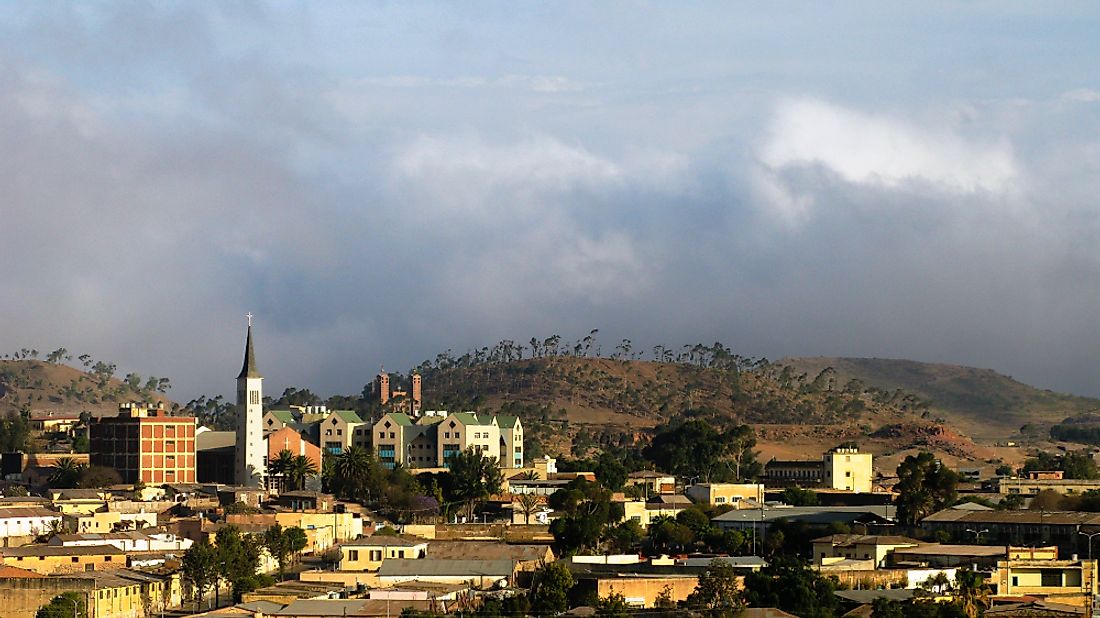What Are The Biggest Industries In Eritrea?

Industries are the driving force behind the economy of any country. The principal industries usually vary from country to country with agriculture generally being the principal industry in developing countries. Developed nations typically have a highly diversified economy to avoid the perils associated with over-reliance on single economic activity.
Eritrea is a nation in Sub-Saharan Africa that occupies a territory of about 45,400 square miles. In 2017 Eritrea's gross domestic product was estimated at $6.1 billion which represented a growth of 3.4% from 2016. Eritrea is a developing country with large sections of the population living below the poverty line. Insecurity hindered the growth of the Eritrean economy particularly during the war which has made the government allocate vast portions of the annual budget to security. The natural resources in Eritrea, particularly land and minerals, are under-utilized mainly due to insufficient funds.
Agriculture
Around 80% of the workers in Eritrea work in the agricultural sector. According to data from the World Bank, most of the crops grown in Eritrea are for subsistence. Despite the significant number of people employed in the agricultural sector, it contributes less than 20% to the country's gross domestic product. The land that can support agriculture in Eritrea is estimated at close to 1,396,000 acres. Eritreans also keep animals such as sheep, camels, goats, and cattle not only as a source of meat and milk but also for export. In 2015 livestock exports accounted for 0.11% of the nation's total export. Agricultural produce is used in food processing industries to produce a wide array of processed foods. The government has undertaken several projects to improve the farming sector to reduce the country's reliance on foreign aid such as using $17 million from the African Development Bank to reduce the severity of drought on farmers. The government has also constructed dams to provide farmers with water for irrigation with a notable example being the Adi Hakefa-Lamza micro dam. The government is also urging farmers to take advantage of the clothing industry and plant cotton, whose production according to the ministry of information has declined.
Mining
Various mineral exploration companies in Eritrea have discovered substantial mineral deposits in the country. Eritrea has a wide variety of minerals ranging from gold to potash. In 2015 exports of mineral ore exceeded 95 % of the state's total exports and were valued at slightly over $424 million. Nevsun Resources, a Canadian mining company, holds the license to mine in the Bisha mine which is 93 miles west of the capital Asmara. The mine is rich in gold, zinc, and copper. Eritrea also has limestone deposits, one of the key ingredients in the manufacture of cement. Eritrea exports some of its cement with Qatar buying most of Eritrea's exported cement. The Eritrean mining sector has not been fully developed as it faces a vast array of challenges chief of which is the significant number of landmines in the country. The insecurity in the country owing to its violent history with Ethiopia has also contributed to the underutilization of mineral resources. Infrastructure in the state is also not sufficiently developed. The government expects that once the mining industry is adequately utilized the nation will experience exponential economic growth.
Energy
The energy industry is essential to the Eritrean economy as the country requires electricity to power its ambitious economic development plan. Three Arab countries which include Kuwait, UAE, and Saudi Arabia partnered with Eritrea to develop an 88-megawatt power plant which was finally completed in 2003. Despite the presence of large quantities oil and natural gas reserves, Eritrea does not produce petroleum locally but instead imports oil and natural gas. The country's reserves are yet to be tapped partly due to its long war for independence. The use of alternative sources of energy has increased in the country mainly due to the government's interest in the sector and diversifying the country's sources of power. The nation's location is a prime spot for the production of solar energy.
Fishing
The Eritrean coastline is approximately 1,388 miles long and comprises of the mainland coastline as well as the more than 300 islands. During the 1950's and 1960's, the sector was active and adequately developed. Like most of the country's industries, the fishing industry was profoundly affected by the war with Ethiopia. After gaining independence, the Eritrean government embarked on a project to rejuvenate the sector after realizing the vital role it could play in the country's economic growth. The part of the Red Sea under Eritrean control has vast quantities of valuable fish species that have yet to be fully exploited for their economic value. Eritreans have begun practicing fish farming in dams such as the Gash Barka dam.
Economic Growth
Eritrea's economy has the potential to grow substantially according to analysis from the World Bank. An 8.7% growth rate in 2011 made Eritrea join the ranks of the world's fastest-growing economies. The country has untapped reserves of minerals particularly precious and base metals that have the potential to drive the country's economy. The government confirmed that Eritrea has untapped oil reserves which if adequately exploited could increase the country's revenue. The Eritrean government is partnering with various world governments to improve different sectors of its economy. Eritrea was ranked 189th when it comes to ease of doing business, and the government has implemented multiple strategies aimed at improving the ranking. The government has implemented new tax policies to ensure it offers a competitive business environment to any company that chooses to invest in Eritrea. According to the country's education minister, Eritrea allocates about 45% of its yearly budget to the education sector to develop the skills of the Eritrean people. The high spending on education is justified by the fact that having a more substantial number of high skilled workers increases the nation's productivity.











